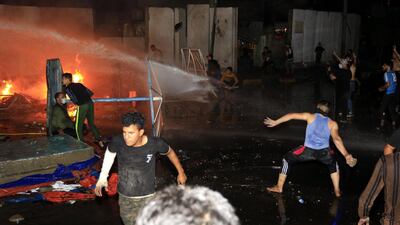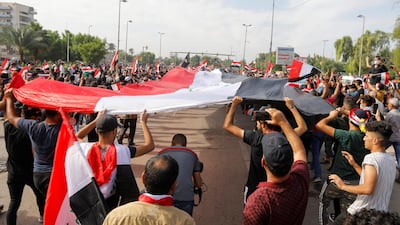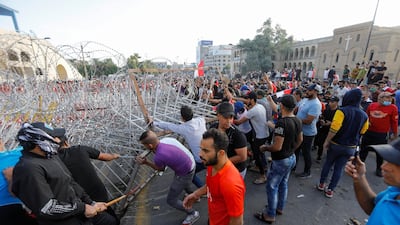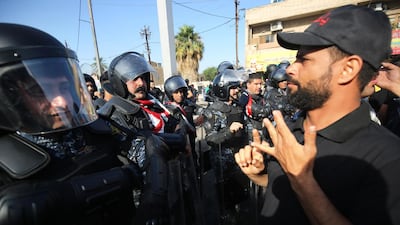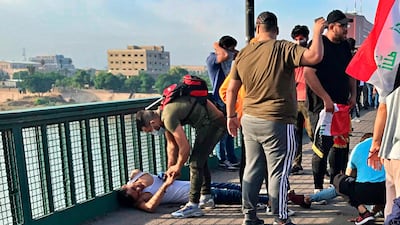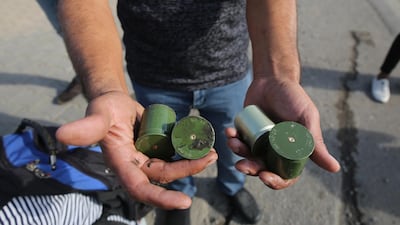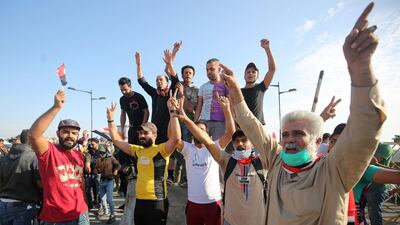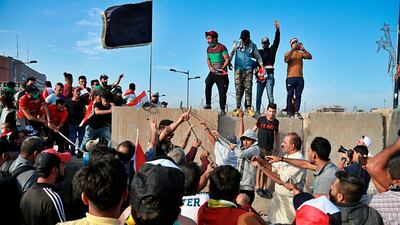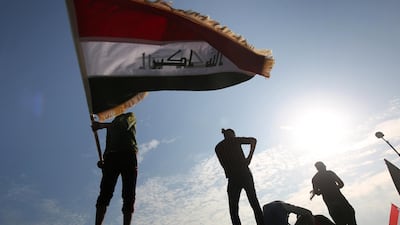At least 24 people were killed and more than 200 were injured in renewed protests against Iraq's government on Friday, Iraq's Human Rights Commission said, despite an appeal from the country's top religious leader for protesters and security forces to remain peaceful.
Friday's protest in Baghdad centred around Tahrir Square, where protesters began gathering the previous night with many vowing not to leave until the fall of the government.
Security forces used tear gas and water cannon to stop people crossing the Jumhuriya bridge into the Green Zone where government offices and foreign embassies are located, but there were no reports of live fire.
Some of the demonstrators died after being hit on the head with tear gas canisters, said Ali Bayati, a member of the Iraqi Human Rights Commission.
“We elected this government, but you see their violence against us,” said a protester who gave his name as Barad. “We only carry the Iraqi flag.”
At least 157 people were killed during the first wave of protests earlier this month, according to a government report published on Tuesday. The report acknowledged that "excessive force" was used.
Two of the protesters carried a picture of their brother who was killed during demonstrations on October 4. “We came to create a revolution for the martyrs,” they said.
Waleed, a young protester, carried the photo of his brother who was killed at the age of 21 in the last round of protests.
“I came out for the martyrs and for our country," he said. "My brother went, so I will go,” he said. “I’m not afraid.”
The resumption of protests marked the first anniversary of Prime Minister Abdel Abdul Mahdi's government and the deadline set by top Shiite cleric Ayatollah Ali Al Sistani for the government to meet protesters' demands.
In his sermon on Friday, the cleric called for restraint as Iraqis resumed their protests to demand an end to widespread corruption, and for basic services such as power and water, and jobs.
Security forces should also deal with protesters with “utmost restraint", Mr Al Sistani, said in a sermon delivered after the protester deaths.
"The authority's insistence that protests must remain peaceful, without any violence, stems not only from its interest in keeping protesters and security forces from being hurt but also from its extreme care for the country's future," he said.
He said "chaos and ruin" would "pave the way for more external interference".
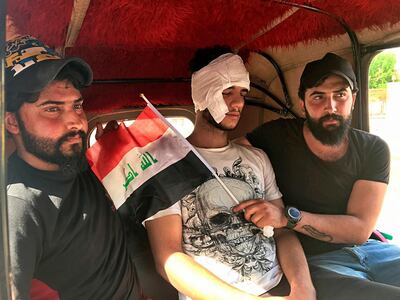
In a televised address late on Thursday, Prime Minister Adel Abdul Mahdi said people would be free to exercise their right to demonstrate but warned violence would not be tolerated.
Mr Abdul Mahdi said a government collapse would drag Iraq into further turmoil.
"The resignation of the government today without a constitutional alternative will lead the country into chaos," he said.
He repeated reforms announced after the protests, including a Cabinet reshuffle, job opportunities for unemployed youth and a new court to try corrupt officials.
Mr Abdul Mahdi also announced that government salaries, including for top officials, would be gradually halved, with funds redirected to a social security fund for the country's poorest.
But the prime minister was the target of the protesters' fury and the corruption that has plagued governments since the US-led invasion of 2003.
“Leave Abdul Mehdi, leave you corrupt politicians. Long live Iraq, Long Live Iraq,” chanted protesters in Tahrir square.
Beyan al-Awadi, a middle-aged woman carrying the Iraqi flag, said: “He (Mehdi) is the cause of the chaos...They (the politicians) have caused chaos for 16 years and we want to fix it.”
The new round of protests has received the backing of influential Iraqi cleric Moqtada Al Sadr, who has a large Shiite support base and who commands the largest number of seats in parliament.
While Mr Al Sadr has called on the government to resign, powerful Iran-backed Shiite militias have stood by the government and suggested the demonstrations were a "conspiracy" from the outside.
People also protested in the southern Iraq on Friday, including the city of Basra where residents have been protesting against the lack of services since last year. In the southern city of Nasiriyah, demonstrators said they would remain in the streets "until the regime falls". Protests were also reported in Najaf and Diwaniyah on Friday.
One in five people live under the poverty line in Iraq and youth unemployment is about 25 per cent, the World Bank says.
The rates are staggering for Opec's second-biggest oil producer, which ranks as the 12th most corrupt state in the world, Transparency International says.
The country has been ravaged by decades of conflict that calmed in 2017 with a declared victory over ISIS.
What followed was a period of relative calm, with security forces lifting checkpoints and concrete blast walls, and traffic allowed in city streets at times once thought too dangerous.
Restrictions even softened around the Green Zone but they were reinstated as protests picked up in October in Tahrir, just across the Tigris River.
